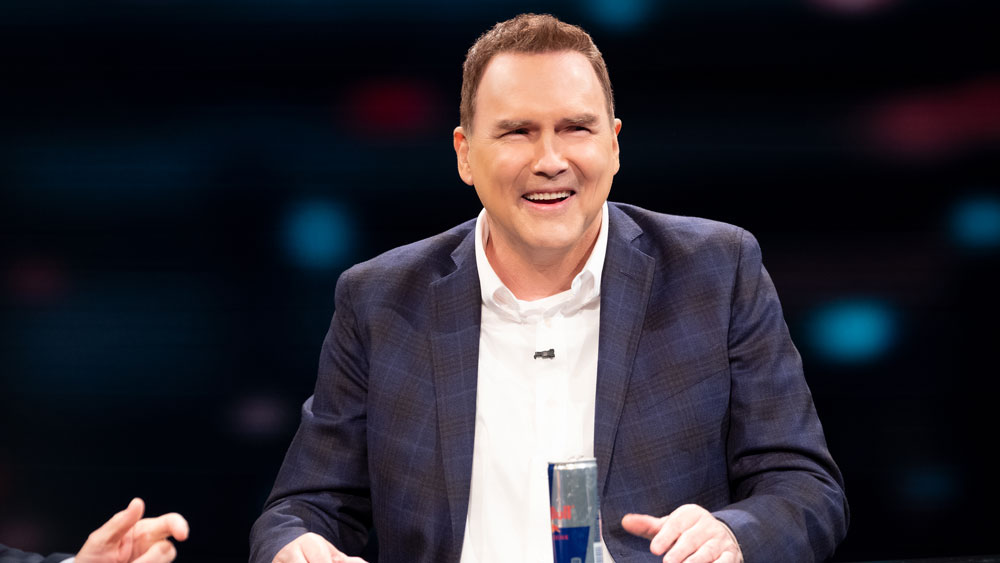TV Review: Netflix’s ‘Norm Macdonald Has a Show’
By Caroline Framke
LOS ANGELES (Variety.com) – “Norm Macdonald Has a Show,” and it’s so stilted and strange, that it’s hard to understand what, exactly, it’s trying to do. Even David Letterman — who’s known Macdonald for years, produces the series, and was the one to suggest he do it in the first place — had to pause halfway through their half-hour interview to marvel at the sheer weirdness of what was happening. “I feel like I’m on a show in another country,” Letterman remarked, immediately inspiring a wave of giggles from Macdonald, his sidekick Adam Eget, and assorted crewmembers lurking just offscreen.
It’s a moment that, much to Macdonald’s delight, repeats itself over and over again in each episode as he, Eget, and a single guest take the sparse stage for meandering conversations. Macdonald punctuates the talks — which are only “interviews” in the absolute loosest sense of the term — with his signature spikes of jarring irreverence to keep things weird and even off-putting. The only constant bit is that MacDonald ends every episode with a series of purposefully terrible jokes, which he and the guest read back and forth as he grins wide. Sometimes, as with David Spade, the guest just raises an eyebrow and goes with the bizarre flow. Other times, as with Drew Barrymore and Jane Fonda, the guest finds a way to hit some curveballs back. Still, he always makes sure to throw them all back on their heels as they attempt to keep up with whatever game he’s playing at any given moment — which is, of course, exactly how MacDonald likes it.
But lest this sound like “ Has a Show” has an actual plan or discernable direction beyond “Norm Macdonald Could Get a Show,” that unfortunately doesn’t seem to be the case at all. Sure, Macdonald’s happy to have this kind of platform, even if only for the Netflix-branded fridge of drinks standing nearby. But even he seems confused by what he — a landmark standup comedian with a deep and often stubborn reverence for the form — is supposed to do with the format of a talk show. At one point, Macdonald mentions to Letterman that he has “no idea what to do with $2 million an episode,” and true to Macdonald form, it’s impossible to tell for sure whether or not it’s a joke.
Altogether, the show feels more like a freewheeling podcast that got filmed for posterity; the only true benefit of having a visual element is to see his guests’ bewilderment balloon in real time. (The Jane Fonda episode, by far the best one screened for critics, has some particularly good moments in this respect.) As evidenced by the constant bubbling of laughs from Macdonald and company throughout each episode, everyone involved is having a great time watching the confusion unfold. And in fairness, why shouldn’t they be? Like Letterman and Jerry Seinfeld before him, Macdonald was lured to by CEO Ted Sarandos expressing his admiration for him. Nothing in TV is guaranteed, but that endorsement is as good a security blanket as any.
And at least in the four episodes I’ve seen so far, Macdonald never quite wanders into the same controversial thickets of conversation that got him into so much trouble with a pre-show print interview ; he purposefully sidesteps topical issues like #MeToo and the downfall of his friend Roseanne Barr to keep the show more evergreen. Watching how he approaches steering his own show, however, it’s not hard to understand how he stumbled into the controversy in the first place. For Macdonald, being a contrarian weirdo is such an intrinsic part of his persona that it would never occur to him that he might need to reel it back when it comes to, say, shrugging off the fact that his friend Louis C.K. harassed women for years. Macdonald’s comedy is so resolutely Teflon-esque, hopping from one conclusion to the next with head-spinning alacrity, that anything sticking to him beyond the end of a sentence must be somewhat bewildering for him.
That might make him a straight-talking hero to some. But in 2018, as so much of pop culture is reevaluating itself with incisive self-awareness and willingness to adapt, it’s incredibly frustrating to watch a comic once defined by his sharp commentary wander so aimlessly through this show just because he can. Even if the question of how Macdonald got this show is easily answered, the question of why anyone outside he and his diehards fans should bother with it never is.
Talk show, 30 mins. (10 episodes; four watched for review.) Premieres Friday, Sept. 14 on Netflix.
Cast: Norm Macdonald, Adam Eget.
Crew: Norm Macdonald, Lori Jo Hoekstra, K.P. Anderson, Daniel Kellison.

